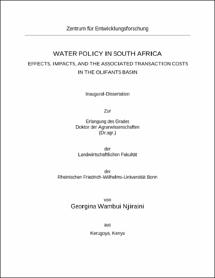Water Policy in South AfricaEffects, impacts, and the associated transaction costs in the Olifants Basin

Water Policy in South Africa
Effects, impacts, and the associated transaction costs in the Olifants Basin

| dc.contributor.advisor | von Braun, Joachim | |
| dc.contributor.author | Njiraini, Georgina Wambui | |
| dc.date.accessioned | 2020-04-21T13:56:23Z | |
| dc.date.available | 2020-04-21T13:56:23Z | |
| dc.date.issued | 24.06.2016 | |
| dc.identifier.uri | https://hdl.handle.net/20.500.11811/6617 | |
| dc.description.abstract | South Africa as a water scarce country recognizes that it is no longer possible to augment existing water supplies. The country has therefore intensified efforts to implement its comprehensive National Water Act, which stipulates various Integrated Water Resource Management (IWRM) policies for better water management. However, water policy reforms continue to face challenges such as the lack of relevant supporting institutional frameworks and problems associated with water allocation continue to persist. The current study presumes that water management policies affect the efficiency, quantity, and quality of irrigation water use and have significant impacts on the welfare of irrigation water users. Additionally, the study posits that significant transaction costs characterize and could inhibit the water policy implementation and compliance processes. Firstly, we followed a comprehensive framework to measure transaction costs and used OLS regression methods to assess the determinants of transaction costs. Findings from the study indicate that transaction costs accruing to water managers’ varied between 13 and 29 percent of total water budget costs. Water users’ transaction costs were 2 percent of other input costs, 1 percent of farm benefits and 27 percent of water purchase costs. Various factors such as compliance to water policy (water pricing, membership in WUAs) and use of ICT for water management significantly influenced transaction costs incurred by water users. Results from the Data Envelopment Analysis (DEA) show that on average, the water use efficiency for irrigation water users was as low as 31 percent. Among the policy factors of interest, compulsory licensing significantly influenced water use efficiency while water pricing and membership in WUAs influenced water use quantities. Water pricing, compulsory licensing and membership in WUAs on the other hand determined water use quality. Evidence from the mathematical programming approaches show that, rising water tariffs have a negative though minimal impact on farmers’ welfare. Small-scale farmers are more adversely affected by rising water tariffs and license fees increases compared to their large-scale counterparts. The effect of price increases on irrigation water demanded for the two types of farmers investigated was somewhat inelastic; however, the large-scale farmers’ water demand was moderately elastic as there were slight reductions in quantities of water consumed due to water price increases. Compulsory licensing fees increases on the other hand resulted in smaller changes in welfare compared to water tariff increases. This study finds various relevant factors affecting transaction costs, water use-quantity, quality, and efficiency, which can act as policy indicators towards better water policy reform and management. The evidence of existing transaction costs is important feedback to guide water policy design and improvement in South Africa. The negative impact of water pricing on small-scale farmer welfare could suggest the need for different pricing strategies for different farmer groups, while an elastic water demand is a necessary condition for water pricing to effectively reduce water use and enhance conservation. | en |
| dc.language.iso | eng | |
| dc.rights | In Copyright | |
| dc.rights.uri | http://rightsstatements.org/vocab/InC/1.0/ | |
| dc.subject.ddc | 330 Wirtschaft | |
| dc.subject.ddc | 630 Landwirtschaft, Veterinärmedizin | |
| dc.title | Water Policy in South Africa | |
| dc.title.alternative | Effects, impacts, and the associated transaction costs in the Olifants Basin | |
| dc.type | Dissertation oder Habilitation | |
| dc.publisher.name | Universitäts- und Landesbibliothek Bonn | |
| dc.publisher.location | Bonn | |
| dc.rights.accessRights | openAccess | |
| dc.identifier.urn | https://nbn-resolving.org/urn:nbn:de:hbz:5n-44013 | |
| ulbbn.pubtype | Erstveröffentlichung | |
| ulbbnediss.affiliation.name | Rheinische Friedrich-Wilhelms-Universität Bonn | |
| ulbbnediss.affiliation.location | Bonn | |
| ulbbnediss.thesis.level | Dissertation | |
| ulbbnediss.dissID | 4401 | |
| ulbbnediss.date.accepted | 01.06.2016 | |
| ulbbnediss.fakultaet | Landwirtschaftliche Fakultät | |
| dc.contributor.coReferee | Hiemenz, Ulrich |
Files in this item
This item appears in the following Collection(s)
-
E-Dissertationen (1127)




